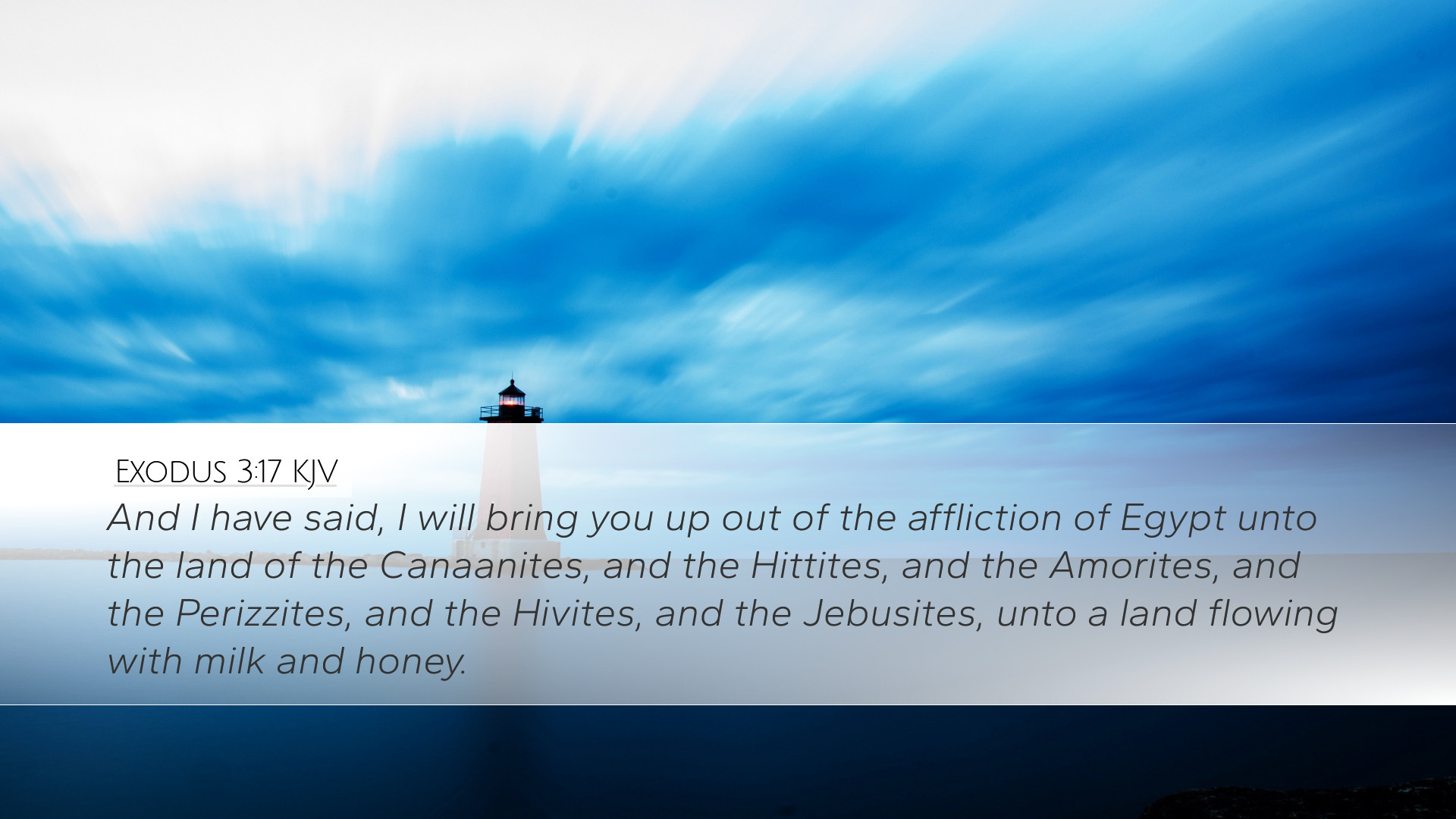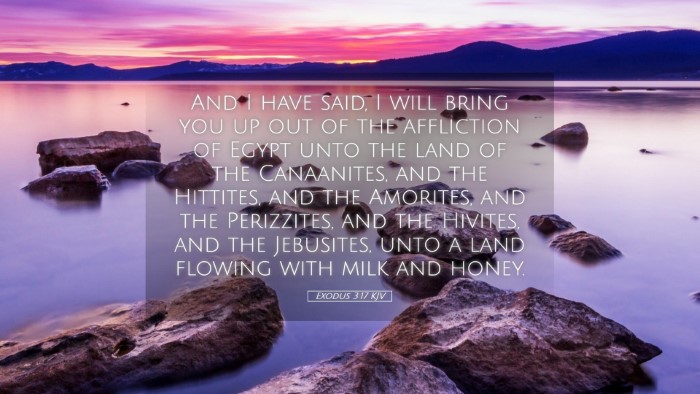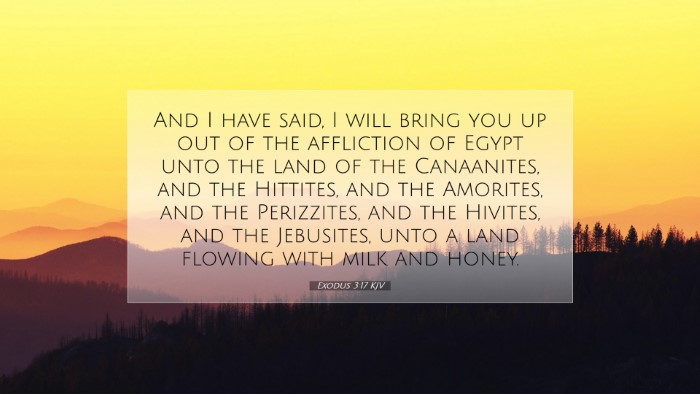Exodus 3:17 - Commentary and Insights
Verse: "And I have said, I will bring you up out of the affliction of Egypt unto the land of the Canaanites, and the Hittites, and the Amorites, and the Perizzites, and the Hivites, and the Jebusites, unto a land flowing with milk and honey."
Contextual Background
The verse occurs during the pivotal moment in Exodus where God calls Moses to lead the Israelites out of Egyptian slavery. This statement encapsulates God’s promise and serves as a pivotal element of the covenant with Israel. It connects the themes of oppression and divine deliverance, providing a glimpse into the faithfulness of God in fulfilling His promises.
Historical Interpretation
Historically, this announcement fulfills a centuries-old promise made to the patriarchs—Abraham, Isaac, and Jacob. The land He refers to is often described as "a land flowing with milk and honey," indicative of abundance and divine provision.
Commentary Insights
Matthew Henry’s Commentary
Matthew Henry emphasizes that the veracity of God’s covenant is not merely in the promise but also in His capacity to fulfill it. He notes the multi-faceted nature of the affliction faced by the Israelites, highlighting God’s attentiveness to their suffering. Henry depicts God’s deliverance as encompassing both spiritual and temporal salvation, affirming that the promise of land is symbolic of rest and the fulfillment of divine promises. Just as the Israelites are led from physical slavery, believers today can seek escape from spiritual bondage through God’s guidance.
Albert Barnes’ Notes
Barnes elaborates on the geographical details of the promised land and the various peoples inhabiting it. He argues that the mention of specific groups—the Canaanites, Hittites, Amorites, Perizzites, Hivites, and Jebusites—highlights the significance of the conquest and the complete establishment of Israel in this land. He notes that God’s promise included not only deliverance from Egypt but also the assurance of victory over these nations. The phrase "flowing with milk and honey" symbolizes prosperity, suggesting that God's blessings are abundant and rich. He further asserts the importance of faith in God’s promise, signifying a crucial trust that the Israelites must have in the quest ahead.
Adam Clarke’s Commentary
Adam Clarke offers a nuanced examination of "the affliction of Egypt," providing insights into the nature of the Israelites' suffering. He underscores the psychological and emotional toll of slavery, juxtaposed against the hope of deliverance encapsulated in the divine promise. Clarke draws attention to the unconditional nature of God’s blessing, marking it as a testament to His grace rather than human merit. Furthermore, he identifies the phrase "flowing with milk and honey" not merely as a trope but as a profound declaration of God’s faithfulness in nurturing His chosen people in abundance. Clarke insists that this promise is a blueprint not just for physical sustenance but for spiritual enrichment and the establishment of a covenant community.
Theological Implications
The implications of Exodus 3:17 stretch beyond the narrative of deliverance from Egypt. The verse speaks to the nature of God’s restorative work, reaffirming His commitment to humanity in the face of oppression. In viewing this through the lens of both the Old and New Testaments, one finds a cohesive narrative of God’s intervention in human history—a promise of not just temporal but eternal deliverance through Christ.
Reflections for Ministers and Scholars
- Trust in Divine Promise: This verse exemplifies the importance of faith amidst trials. Ministers can draw upon this commitment to encourage congregations to trust in God’s leading despite current circumstances.
- God's Abundance: The imagery of a land flowing with milk and honey serves as a profound reminder of God’s capacity to provide. This can be a source of hope for believers, advocating for a relationship that anticipates God's active provision.
- Application of Covenant Theology: The fulfillment of God's promise in Exodus invites a deeper exploration into covenant theology. The assurance of deliverance and land can serve to deepen understanding of God's ongoing relationship with His people throughout biblical history.
- Role in Salvation History: This moment in Exodus is pivotal for understanding the wider narrative of salvation in Christianity. The themes of exodus and deliverance resonate through both Testaments, finding their ultimate fulfillment in Christ.
Conclusion
In summary, Exodus 3:17 is not just a historical declaration but a profound theological statement that resonates through generations. It encapsulates God’s faithfulness and the hope that He provides in times of affliction. This promise continues to inspire and challenge ministers, theologians, and students of the Bible to reflect on God's unwavering commitment to His people and the richness of His provision.


